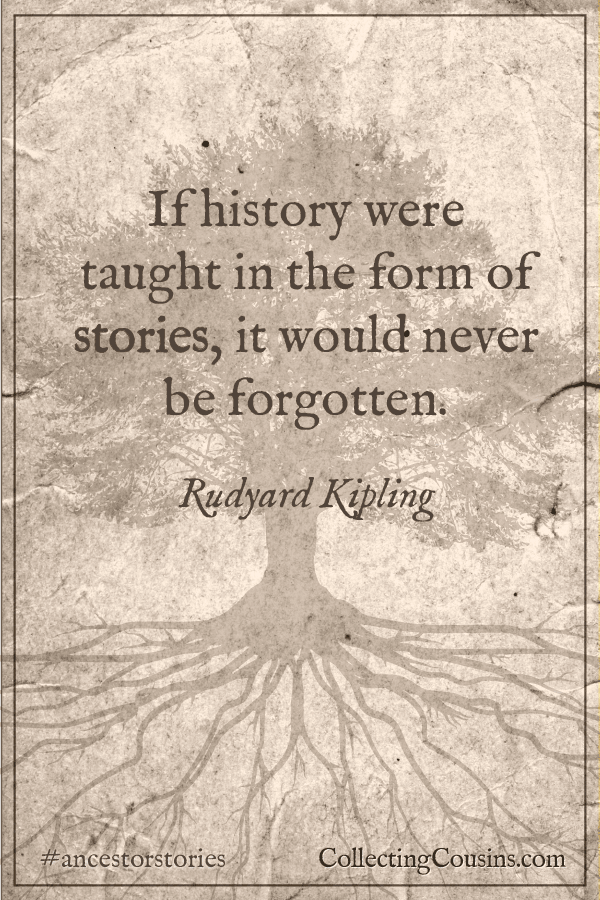From the Editor
 Hello, and welcome to the first issue of Collecting Cousins newsletter!
Hello, and welcome to the first issue of Collecting Cousins newsletter!
Have you ever noticed that when history is told in story form that it is much more interesting? There is nothing quite like 19th century New Orleans as a backdrop, and I shared part of an ancestor's story I am writing with a friend recently. She later wrote to me and said, "I've been hearing Auguste's story run through my mind with New Orleans in the background, and I like that a lot." There is something about giving people a sense of time and place that gives them an investment in the person. The first segment of Auguste's story is previewed below*.
In this and each newsletter issue you will find a couple of new helpful resources I've found and a list of recent blog posts on the website. I hope you find it useful, and thanks again for subscribing!
Warm regards,

Resource Freebie
CensusTools genealogy spreadsheets were created by Gary Minder as a result of his inability to find a practical solution to keep track of the census data found in his research. CensusTools provides researchers with quality tools to electronically record, preserve and archive family history data. You can download the 1940 census spreadsheets for free at the below link. If you like them, I think you'll find the entire pack of 40 spreadsheets a welcome addition to your genealogy toolbox.
Download the 1940 Census Spreadsheet for FREE »
Genealogical Resources
List of All Extant Sanborn Maps
Sanborn Maps give detailed descriptions of the properties on every block mapped over a course of several decades for many urban areas. The details include materials used, number of stories, outbuildings, number and placement of windows, and more. There is no one place to find the entire Sanborn Map collection, as many different archives and online repositories have copies for various locations. The Earth Sciences & Map Library at UC Berkeley keeps an inventory of all extant Sanborn Maps and where they can be found, saving genealogists the trouble of searching many different repositories to find which collections include the maps.
Old Regime French Spelling Conventions
Family Tree Magazine ran a feature recently by Kimberly Powell about researching French documents. Kimberly is About's Genealogy Expert and has valuable helps on her site for anyone researching French ancestors. After visiting her site, I was motivated to do some searching of my own. Reading and understanding the documents that I found (and I did find some for my French ancestors) was confusing, and this list of spelling conventions was helpful for understanding the use of certain spellings and abbreviations, such as the last four months of the year having special abbreviations and December being abbreviated Xbre. If you never took any French classes, this French glossary will be helpful to you also.
Recent Posts
How To Digitize Family History Cassette Tapes
 For those of us lucky enough to have recordings on cassette tape with valuable family history information, finding a way to preserve those recordings for future generations can be a challenge. I'm pretty comfortable with technology but it still took me awhile to figure it out, so hopefully what I learned will help someone else. Read More »
For those of us lucky enough to have recordings on cassette tape with valuable family history information, finding a way to preserve those recordings for future generations can be a challenge. I'm pretty comfortable with technology but it still took me awhile to figure it out, so hopefully what I learned will help someone else. Read More »
Courthouse Genealogy Research 101
 The first time I visited a courthouse for research, I had no idea what to expect and prior to arrival was quite intimidated. I quickly found that finding your way around is usually very straightforward and using the records is fairly consistent from locality to locality. Since some of the most valuable genealogical information available is sitting - in many cases undigitized - in courthouses, it is worth pushing through the fear factor. Read More »
The first time I visited a courthouse for research, I had no idea what to expect and prior to arrival was quite intimidated. I quickly found that finding your way around is usually very straightforward and using the records is fairly consistent from locality to locality. Since some of the most valuable genealogical information available is sitting - in many cases undigitized - in courthouses, it is worth pushing through the fear factor. Read More »
If You Can Remember Your Password, It’s Probably Not Secure
 Recently on the Genealogy for Technology Facebook group, someone asked about password managers. I am a fan of 1Password, but there are others out there that work just as well. Password managers work by creating a new randomly generated password for each site you create a login for. Those passwords are stored along with your username in an encrypted database that is protected by a master password. (In order to work well, your master password should be difficult to crack.) Some systems have their own servers for syncing and some use Dropbox or other cloud-based storage systems. I use 1Password with Dropbox and it syncs my password database across all of my devices almost instantaneously. These password managers allow you to isolate each account from all of the others by using a hard to crack password that isn't used anywhere else. Read More »
Recently on the Genealogy for Technology Facebook group, someone asked about password managers. I am a fan of 1Password, but there are others out there that work just as well. Password managers work by creating a new randomly generated password for each site you create a login for. Those passwords are stored along with your username in an encrypted database that is protected by a master password. (In order to work well, your master password should be difficult to crack.) Some systems have their own servers for syncing and some use Dropbox or other cloud-based storage systems. I use 1Password with Dropbox and it syncs my password database across all of my devices almost instantaneously. These password managers allow you to isolate each account from all of the others by using a hard to crack password that isn't used anywhere else. Read More »
An Immigrant’s Tale
August Dupuy
January 1853
New Orleans
There was no other choice. It would have to be the Orphan Boys’ Home.
The boys’ home, officially known as the Asylum for Destitute Orphan Boys (although often called the simply the Orphan Boys’ Home or the Male Orphan Asylum), was located at Jackson and Josephine at Chippewa not far from the riverfront. The asylum was not particularly close to Bouligny, but the three mile distance was near enough that Auguste could get there on his own with no money and no help.
It may as well have been called the Asylum for Desperate Orphan Boys, for that is what he was. With no parents and now no home, he had nowhere to turn except the place from whence he had come. Anything would be better than staying with the painter.
On that March day almost two years earlier when he had left the asylum to be delivered to Joseph Carron, the painter from Faubourg Bouligny, the morning clouds gave the appearance that it might rain. The river was in danger of overflowing the levees in spots and the state of the levees was a constant concern in this city where the brutal force of water was held back only by the embankments. More rain was the last thing the river needed, since just two days before an inch and a quarter of rain had fallen on the city. It did rain – about a third of an inch – driving more concern about the condition of the levees throughout the city.
As he had made the trip north to the painter’s home in Jefferson City, Auguste’s concern had been not so much about the rain or the levees. He was being sent out “on trial” to learn the painter’s trade, and if Mr. Carron found him satisfactory, Auguste would become his apprentice. The agreement may have been “on trial” for Mr. Carron, but Auguste had been in no position to reject an offer of learning a trade. There had been little choice on his part.
As an orphan whose father he could barely remember...
*A future blog post will explain how I was able to fill in the details to create a historically accurate setting for "An Immigrant's Tale" that will give insight into how anyone can create a narrative to bring their ancestors' stories to life.
